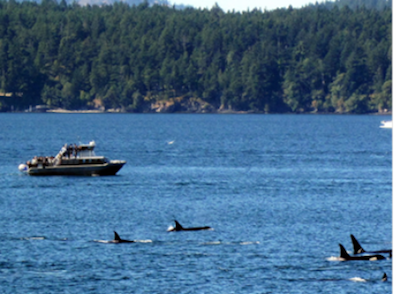Native Americans Gain Standing in Climate Science

Update: Just this month, the Lummi tribe is credited with pausing construction of a coal part in northern Puget Sound.
October 13, 2013: Last Tuesday, a pod of three-dozen orca whales escorted a Seattle-to-Bainbridge Island ferry transporting ancient tribal artifacts to their new home at the Suquamish Museum. As reported on The Huffington Post, the Suquamish Tribal Chairman Leonard Forsman watched the orcas swarm the ferry as it neared the terminal.
“They were pretty happily splashing around, flipping their tails in the water,” Forsman said the next day. “We believe they were welcoming the artifacts home as they made their way back from Seattle, back to the reservation.”
My first reaction was this: just when Native Americans are gaining a toehold in the climate change discussion, gaining two seats on Obama’s 25-member Climate Task Force, they come out with a statement that strains their credibility.
Our national mythology holds that Native Americans are caretakers of the land. They’ve driven efforts in Washington State to restore rivers and contest coal portsthat threaten the sea life on which their livelihoods depend. They fight for burial grounds and sacred places, neither of which have a place in our scientific belief system. Their sovereign rights to do so are inarguable, and they’re beginning to win.
But when the race is based in Western notions of power and science, Native people generally lose. Think about the credentials tribal members bring to the Climate Task Force. One is Karen Diver, Chairwoman of Fond du Lac Band of Lake Superior Chippewa, a small reservation whose population was 3,728 in 2000; the other is Reggie Joule, mayor of the Northwest Arctic Borough (pop 7,523), a former athlete, contractor and Alaskan state representative whose legislative focus was finance and education.
Contrast these Native American Climate Task Force members with, for example, Jay Inslee, Governor of Washington. As a member of the U.S. Congress, Inslee served on caucuses for oceans, animals and international conservation. In 2007, Inslee wrote a book that Publisher’s Weekly called an “energetic articulation of a clean-energy future.” In his campaign and as governor, Inslee embraced environmental leadership, most recently signing the agreement for a Pacific Coast Action Plan on Climate and Energy.
And yet Obama believes Diver and Joule will be valuable contributors. Why?
Eighteen months ago, the Northwest Native Americans organized a conference in Washington D.C. for tribal leaders from across the country, in part to bridge the gap between climate change scientists and Native Americans. While tribal members shared an abundance of anecdotes about changes in natural patterns — for the first time last year, pelicans were observed in the Pacific Northwest — they also reported quantitative measurements. As the University of Washington oceanographer Jan Newton told the Seattle Times, “[Native Americans] were on the ground making some of the measurements the university scientists couldn’t get out to do.”
Indian Country Today reports that “traditional knowledge and Western science find themselves intersecting more and more.” One example: last month’s special issueof the peer-reviewed scientific journal Climactic Change was devoted to indigenous perspectives on climate change. As Indian Country’s Tanya Lee writes:
“Common sense demands that governments bring tribes to the table as full participants in a discussion of how to deal with the challenges that climate change presents and that they treat indigenous viewpoints not as quaint supplements to Western science but as equally valid explanations of how the world works—that such observations, taken as they are over millennia, are a science in their own right.”
The Climactic Change issue begins with an abstract from the Native American writers that states the fundamental premise of climate change collaboration:
“Despite a keen awareness of climate change, northern Indigenous Peoples have had limited participation in climate-change science due to limited access, power imbalances, and differences in worldview. A western science emphasis on facts and an indigenous emphasis on relationships to spiritual and biophysical components indicate important but distinct contributions that each knowledge system can make.”
If it’s not enough that a scientific journal article puts the “indigenous emphasis on relationships to spiritual components” on the same level as scientific fact, take a look at Obama’s November 1st executive order, “Preparing the United States for the Effects of Climate Change.” For the first time, Obama repeatedly refers to “partnership with State, local, and tribal governments.”And then there’s last week’s story of the whale escort delivering Native American artifacts. If the Native Americans’ spiritual, relationship-based approach to climate change is a knowledge system equal to Western science, who am I to question their friendship with whales?

